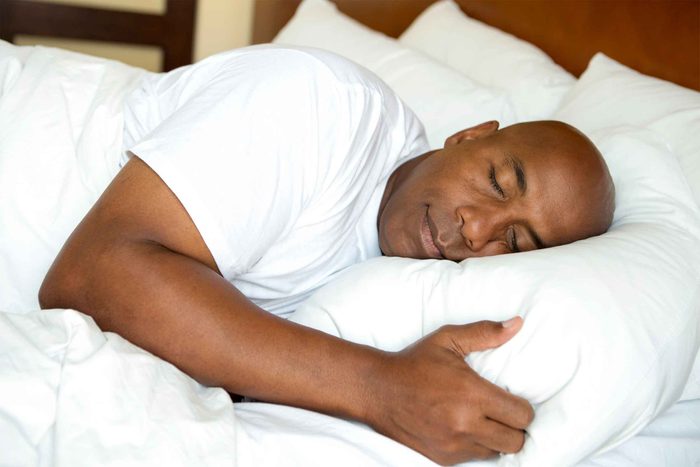
Change your sleeping position
A number of things can cause you to snore, including your sleeping position—specifically, sleeping on your back. “Sleeping on the back is the healthiest position to adopt, but most people have weak jaw muscles, [often] from a soft, high-calorie diet that causes their mouth to open during sleep,” says Anil Rama, MD, Adjunct Clinical Faculty at the Stanford Center for Sleep Sciences and Medicine, Medical Director of Kaiser Permanente’s tertiary sleep medicine laboratory, and author of SHUT UP and Sleep. “When the mouth opens, the lower jaw falls back and constricts the air passageway, and voila—snoring is born. Sleeping on the side prevents this, and hence the snoring is reduced or eliminated.” Using a full-length body pillow can help you sleep on your side. Or if you really want to stop your mouth from opening when you sleep, some are even trying mouth taping. Don’t miss these other doctor-approved secrets for better sleep.
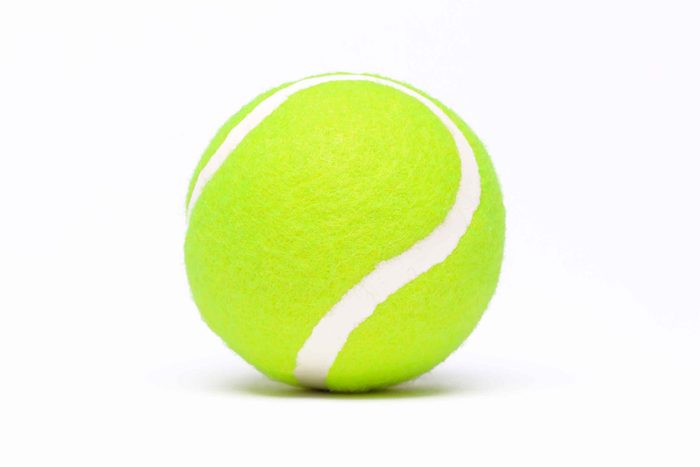
Sleep with a tennis ball
Since sleeping on your back can ratchet up the snoring, this inexpensive trick can help you sleep on your side. “There are devices that can be worn at night to help prevent rolling on your back at night, or you can make your own by sewing a tennis ball into a shirt that you wear to sleep at night,” says Jordan Glicksman, MD, an otolaryngologist (head and neck surgeon) and part-time lecturer at Harvard Medical School. “This encourages people to sleep on their side, as it is hard to sleep [when you’re] uncomfortable.”

Prop up your bed
For easy snoring relief, try sleeping on an incline. According to the Mayo Clinic, raising the head of your bed by about four inches can stop snoring by preventing your tongue from blocking your throat and opening up your airway. “This can [also] be facilitated by beds that can be adjusted to have an incline,” adds Dr. Glicksman, “or for a less expensive option, you can use a wedge pillow.” If you’re having trouble falling asleep, try these natural sleep remedies that actually work.

Avoid alcohol
Drinking alcohol before you sleep can make snoring worse. This is because alcohol reduces the muscle tone of your throat, which can lead to increased airway resistance and make you more likely to snore, says Dr. Glicksman. To help fix loud snoring, Cleveland Clinic recommends avoiding alcohol and snacks for at least four hours before hitting the sack.

Use a nasal rinse
Rinsing your nasal passages with a simple saline solution can ease congestion and reduce snoring. The Reader’s Digest book Doctors’ Favorite Natural Remedies notes that nasal irrigation can assist the elimination of waste products from the nose, nasal passages, and sinus cavities, helping to counteract the effects of pollution, dust, and pollen. If you think your snoring is due to nighttime congestion, a cold, or allergies, try using an over-the-counter product like a neti pot. Check out these 50 other ways to sleep better.
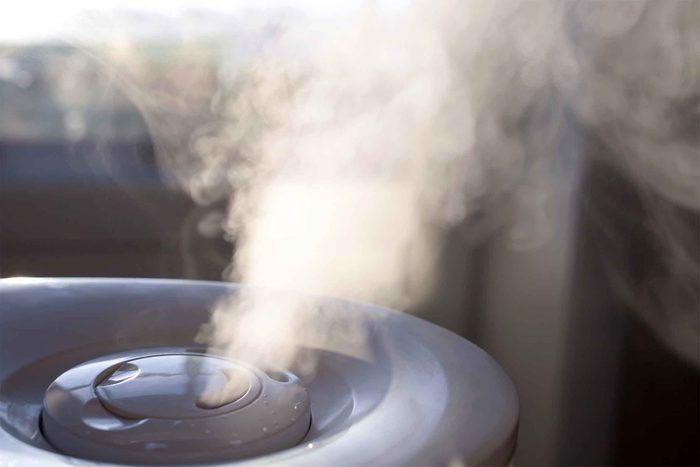
Get a humidifier
It’s possible that the dry air in your room is causing congestion—and snoring. A stuffy nose could create a slight vacuum effect in your throat, making inhaling and exhaling a lot tougher and noisier. But a little moisture from a humidifier could go a long way. “Any intervention that opens the air passageway and reduces the resistance to breathing will improve snoring,” says Dr. Rama. “Humidification reduces nasal congestion, which opens the airway and makes it easier to breathe.”
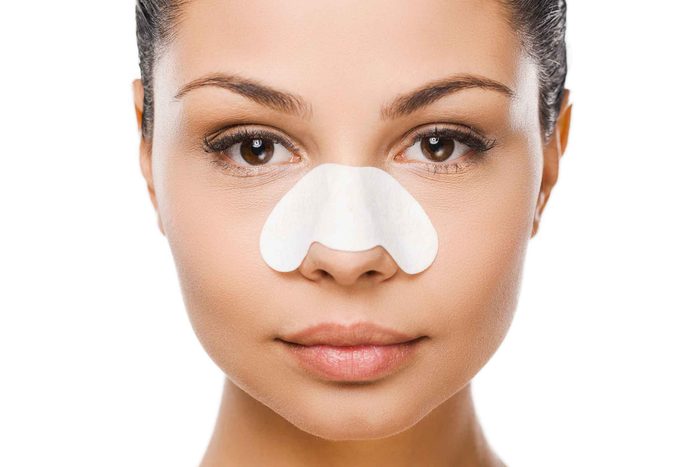
Try nasal strips
Nasal strips can be helpful if your snoring is caused by a blockage, since the strips pull the nasal passages open from the outside. That said, according to a review of research on nasal dilators published in Pulmonary Medicine in 2016, while these products can help improve breathing in many cases, they are not effective when it comes to obstructive sleep apnea. Don’t ignore these silent signs of sleep apnea.
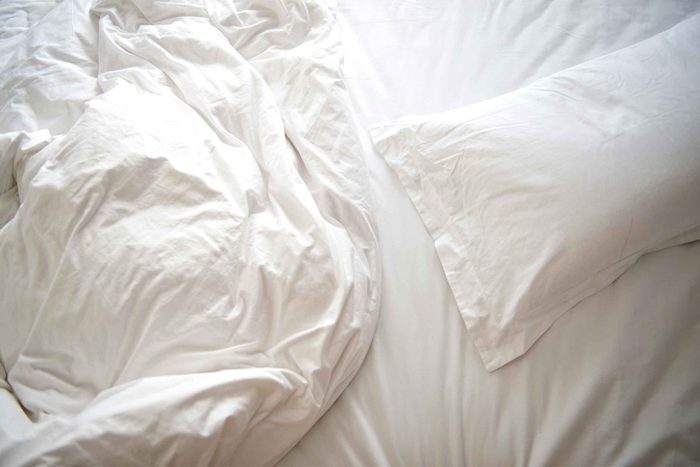
Change your sheets regularly
If you feel fine all day but you’re congested at night, it might be due to allergies. Allergens in your bed can irritate your airways, which can lead to snoring, according to Sleep.org by the National Sleep Foundation. Make sure you change your sheets and pillowcases regularly, as well as put your pillows in the dryer on the “fluff” setting every few weeks, to reduce dust mites, dander, and other allergens that can cause respiratory issues.
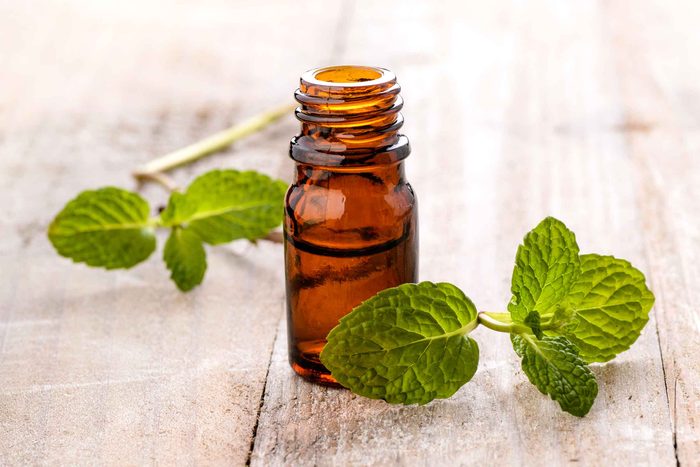
Try products with peppermint
Herbal remedies like peppermint oil or peppermint mouthwash may be able to relieve mild snoring. You can try dabbing a small amount of peppermint oil under your nose to open up your nasal passages, or use peppermint mouthwash to potentially shrink tissues in the throat. Or, if you have a humidifier, you can add few drops of peppermint oil to the water before bed. But, according to a review of research published in the Flavor and Fragrance Journal in 2015, pregnant women should avoid using peppermint oil since there is a lack of evidence about its effects, and it also shouldn’t be used around children under 2 because the menthol in it may cause breathing issues. For other natural ways to cure what ails you, check out these 50 natural remedies that really work.

Lose weight
“Fat makes muscle tissue more collapsible,” says Dr. Rama. “Hence, someone who gains weight will be more likely to collapse the muscles in the throat and raise the risk for snoring. On the flip side, losing weight will eliminate adipose tissue, improving muscle tone and breathing.” Although he says there is no agreed-upon target for weight loss, he often recommends that his obese patients aim for a 10 percent weight reduction.

Quit smoking
Smoking may increase your chances of snoring since cigarettes irritate the lining of the throat, causing swelling, and increase inflammation, discharge, and fluid retention in the upper airway. According to the Mayo Clinic, smokers are a whopping three times more likely to have obstructive sleep apnea (which is one cause of snoring) than those who’ve never smoked. Dr. Glicksman adds, “It isn’t completely clear why avoiding tobacco can improve snoring, but one theory is that it may relate to nicotine withdrawal at night.” If you’re trying to give up your nicotine habit, don’t miss these 23 tips that will help you quit smoking.
